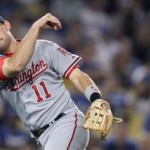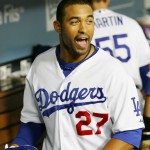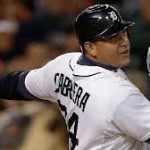I was out all last week, hence the radio silence here. I couldn’t help posting yesterday though about the Nats blowing another excellent start. So lets get back into the swing of things with another episode of Tom Boswell‘s weekly chats, this one for 5/13/13. As always I write my response here before reading his, and sometimes edit questions for clarity.
Q: With the technology we have today, do we really need umpires anymore?
A: You know, the answer is probably “Yes, we could replace Umps with robots” and have a better product on the field … but the implementation details seem so difficult that I doubt it ever really fully happens. You have to have real people on the field to deal with all the randomness that occurs in baseball games. I think the best eventual solution will be to have challenge systems put in place like we have with Football, only hopefully done much much faster. Sort of like the NHL’s New York-office based replay officials. The strike zone issues we’re seeing lately though are troubling; can you automate a strike zone call with players who move and bend over in mid-swing? How do you establish a strike zone for these guys? Inside and outside are no problem, but up/down is tough. Boswell supports robot strike zones.
Q: If Harper had been just a normal everyday player, coming up through the system, would that swing of his — namely the left foot coming up and the seemingly wild attack at the ball — have been beaten out of him by now by the coaches?
A: Not necessarily. But if Bryce Harper had been a “normal” prospect instead of an uber-prospect then I think he would have had adjustments pushed onto him. There have been successful players with that trailing foot off the ground; Frank Thomas and Roberto Clemente come to mind. I always have a pet peeve personally when I see a hitter who lifts his back leg; I have the same issue in my own swing and was told by a high school coach that it was a flaw. Well, I don’t think guys like Clemente and Thomas were flawed hitters. I think it is what it is; if you feel comfortable hitting off your front foot and are successful, then so be it. Boswell notes Clemente and a few others who have this trait, and agrees with me that it’s an overstated issue.
Q: Is this the breakout season for Jordan Zimmermann? Is it the changeup? I’ve never seen him look so in control out there.
A: Can it be as simple as Jordan Zimmermann has finally fully recovered from Tommy John surgery? Fangraphs shows pretty consistent frequencies and speeds of his pitches from last year to this year. One thing that jumps out for me right now is his very low BABIP (.209 so far this year). That smells like some regression. So while he can’t sustain his ridiculous numbers (1.59 ERA through 7 starts), he does seem to be on track for a very good season. Cy Young capable? With his current W/L streak and peripherals, he may pitch his way into the conversation. Boswell notes that Zimmermann would have been in top 10 of league ERA last year with a few more IP, and that poor run support has cost him wins for years … so this all likely is Zimmermann finally getting the full package.
Q: How concerned are the Nats about Zimmerman’s shoulder?
A: Can’t speak for the team, but is anyone happy with Ryan Zimmerman‘s throwing issues right now? Nothing has changed from what I wrote in Mid-April about the situation. And I don’t know what the team is going to do with him. Jon Heyman quoted an anonymous competing Front Office executive after Zimmerman signed his big deal that the Nationals “now have two $100M contracts but no $100M players.” It pissed me off at the time … but is really hard to argue against now. Will these contracts hamper this team’s development and/or ability to sign all its players in a few years time? We’ll see. Boswell mirrors what i’ve written before; the team has no place to put Zimmerman and they have to just ride it out.
Q: Drew Storen looks like a different pitcher this year. ERA is up to 4.73, and for the first year since his debut I’m nervous when he takes the mound. What gives?
A: A great question. Others here have predicted that Drew Storen may be demoted this season due to performance. His blowing of the Gonzalez gem was just one more nail in his coffin. But a look at the stats shows that he’s basically been unlucky so far this year. Most of his peripherals are improved in 2013 over last year; his K/9 is up, BB/9 is down. His BABIP is incredibly high right now (.370). Despite an ugly ERA his fip/xfip numbers are normal and low. His velocity is a tick lower this year but not appreciably so. I think he’s just been unlucky and will improve with more innings as he regresses downwards to the expected mean. The one thing stats can’t measure though is his mentality; is he “depressed” because he’s not the closer? Any way you spin it, the acquisition of Rafael Soriano represented a “demotion” for Storen, and it comes on the back of a pretty demoralizing NLCS game 5 meltdown last year where Storen single handedly lost the series for a team that most thought was the best in the game. Boswell says his stuff is still “plenty good” but that he’s screwing around with too many pitches in his outings, relying on his sinker too much. He needs to just go after hitters. I agree; young guys have a tendency to nibble and work backwards if they’re too clever (see Bauer, Trevor) and need to listen to their pitching coaches.
Q: When errors occur or a bad call is made, Strasburg appears to have a difficult time making the necessary pitches to get out of an inning. Is this just an example of him being 24 and still learning or is there a bigger long term issue?
A: Great question again (lots of good ones here). We’ve all played behind pitchers who lost their composure when a simple error occurs behind them (in adult leagues, this pretty much happens on every other ground ball, so you have to learn to go with it). Stephen Strasburg‘s mental breakdown after Zimmerman’s latest throwing error, leading to 4 unearned runs and a loss in a game where I thought perhaps he had no-hitter stuff, was really disappointing. Is it him being young and immature? Could be, though I have never gotten the impression that Strasburg ran on the immature side. How can you, when you have so much career hype? But the evidence speaks for itself; when your manager and your catcher call you out in the press for losing your composure, you have some work to do. Boswell posted a fantastic stat; 15% of Strasburg’s career runs allowed were unearned, twice what Justin Verlander has allowed in his career. That’s incredibly telling. Strasburg needs to work on his mental approach after bad things happen behind him.
Q: So Bryce has cooled off some, but what concerns me more is that even when he was scalding hot, he was hitting LHP. Should we be concerned? His OPS against LHP is .502.
A: I’m not concerned about Harper’s Lefty split, since nearly every left-handed batter in the game has a bad lefty split. He looked downright awful against lefties in 2012 (highlighted by his 5-K game against Andy Pettitte and the Yankees), but has made adjustments. Now it seems that the league has re-adjusted, so Harper needs to re-adjust. So far in his young career, Harper has shown how well he adjusts (he’s years above his age in this regard), so I have confidence he’ll be ok. Boswell prints some great numbers so far for Harper and says he’ll be ok.
Q: I recently read two articles that said that sabermetics considers a strikout to be no better or worse than any other out. This fact does not seem to make sense because missing the ball completely with two strikes eliminates any chance for productive outs, for foul balls leading to another chance, or reaching base due to normal batting average on balls in play. Also, psychologically, a strikeout has to be more deflating to the individual and team than another out. Thoughts?
A: There’s a weird dichotomy in sabremetrics in this regard: batter K’s are “not that bad” but Pitcher K’s are what everyone strives for. Doesn’t this seem at odds with itself? The only reason I can think that a K is “ok” if you’re going to make an out is if it somehow prevents a double play. But this is a research-worthy topic. I also heard a great stat on a podcast; 3 players struck out 40 or more times in April of this year (if memory serves it was Jay Bruce, Chris Carter, and Mike Napoli). Joe DiMaggio didn’t strike out 40 times in a season his whole career. The league is just different now. Boswell doesn’t really say much on the question other than the DP angle.
Q: Yesterday’s game was as strong an argument as I could make for the National League to use the Designated Hitter. Gio should have been allowed to finish the game with his low pitch count and excellent throwing, but he was pulled for a batter (who did nothing). Forget tradition! If we had the DH, we could have kept Michael Morse! And we probably would have won yesterday.
A: A good ancillary point to my rant on Gio Gonzalez‘ replacement the other night. I support a DH across both leagues and posted many good reasons in this space in March 2013. No reason to repeat them here, but this question goes to points #2 and #4 in my March post (fan experience and NL pitcher’s getting limited). Boswell talks about the Gio decision and not really about the DH.
Q: Is Zim still among to the top 5 or top 10 3rd baseman in the majors in your opinion?
A: Interesting question. A quick glance at the Third Basemen on depth charts around the league leads to this list of players who I would take right now over Zimmerman: Miguel Cabrera, Evan Longoria, Adrian Beltre, David Wright, and maybe even Chase Headley or David Frese. Now counting contract status/potential at this point given Zimmerman’s money owed and his declining performance on both sides of the ball, I’d think hard about Manny Machado, Bret Lawrie, Todd Frazier, Nolan Arenado, Pedro Alvarez and Pablo Sandoval. Of course, potential is potential and Zimmerman already has a long list of accomplishments in this game, so on the whole of his career i’d put him just behind Wright in the above list. So yeah I think its safe to say he’s a top 5 third baseman right now. Ironically in my Yahoo Fantasy list, he’s also #5 and listed exactly behind the four guys in that upper grouping, in that exact order. Boswell says no, not defensively. But i’m not sure that’s entirely how you judge players these days. Cabrera isn’t exactly a gold glover at third but would anyone say he’s not the “Best Third Baseman” in the game?
Q: No doubt that Jayson Werth is a phenomenal locker room presence and his home run in the playoffs last year was one of the highlights of the year, but he missed half the season last year and is on the DL now. He turns 34 next Monday and the Nats have him on contract for 4 more years. What do you think they can legitimately expect from him?
A: I think you expect Jayson Werth to contribute in the same ways he did in 2012; around a 125 OPS+ with some power and a lot of OBP. Eventually he moves to left field, where he should be a excellent defender in the latter years of his contract. It is what it is: the Nats paid him for his four years of unbelievable offense in Philadelphia, and he’ll be lucky to get back to that level in his mid 30s. Boswell agrees.
Q: Is Denard Span the best centerfielder we’ve had since Clyde Milan? I don’t recall seeing a smoother Washington centerfielder.
A: Easily the best “all around” player to play center since the team moved here. I’d probably argue that Rick Ankiel was better defensively and clearly had a better arm, but Denard Span‘s consistency at the plate gives him the easy nod overall. Can’t speak to years prior to 2005. Boswell agrees and signs off.




